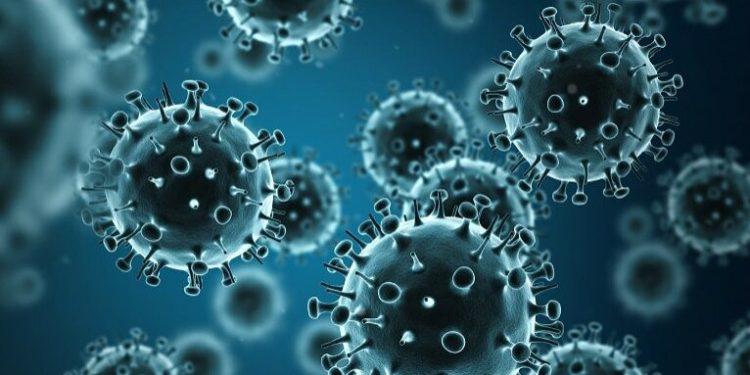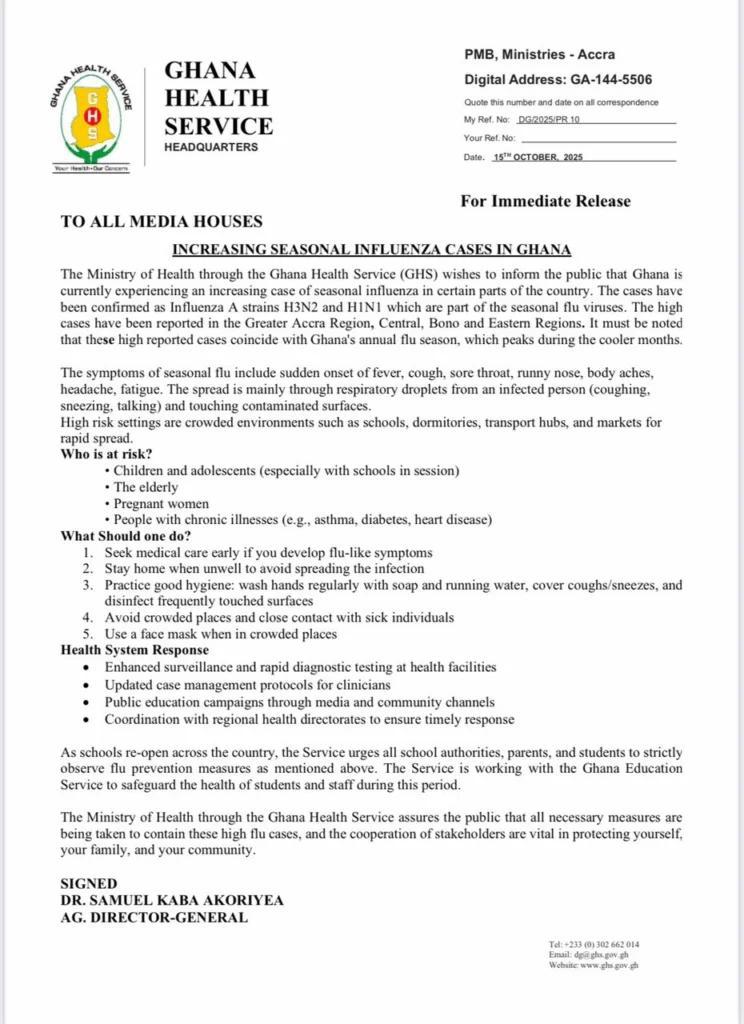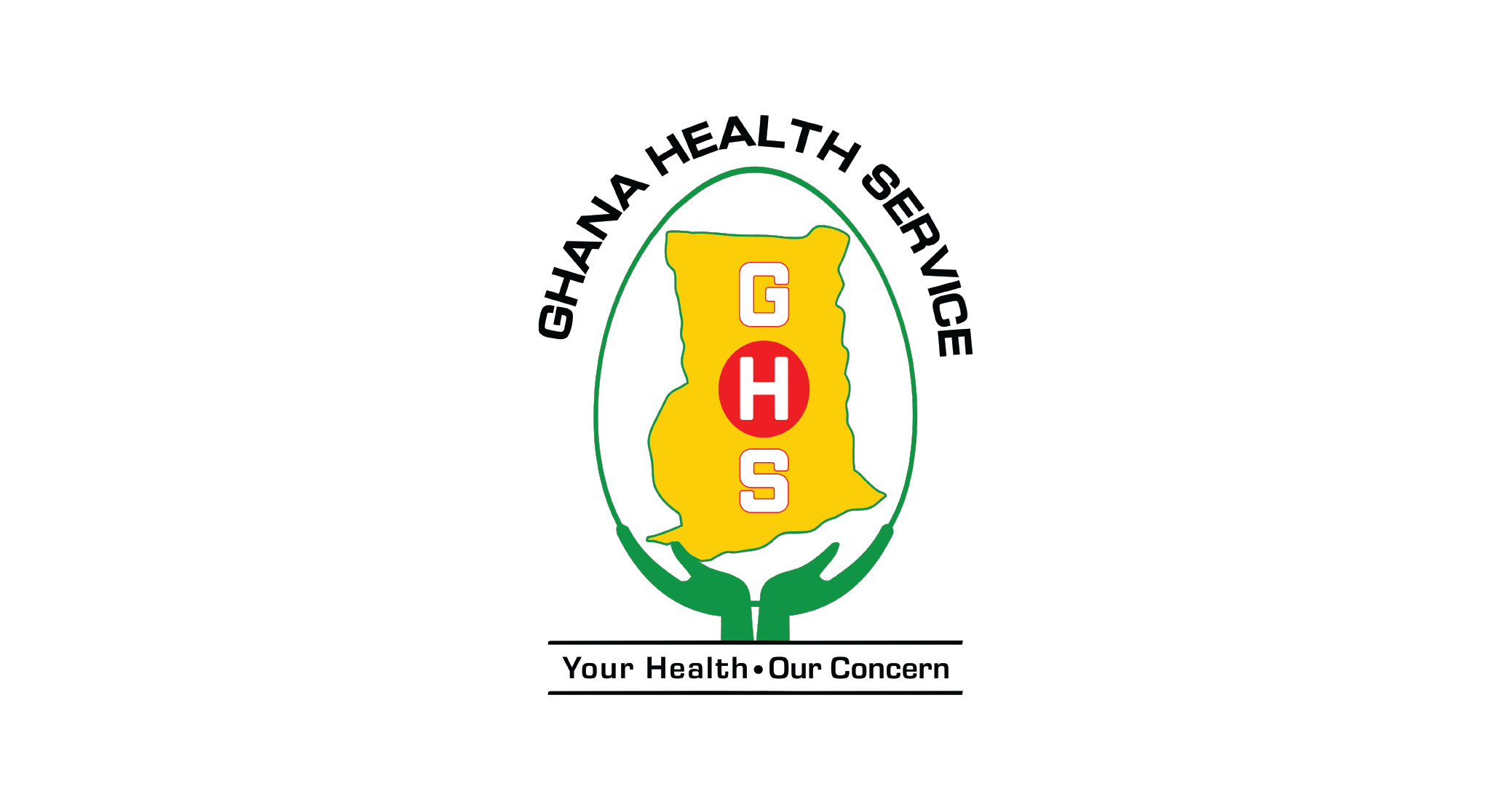GHS Alerts Public to Surge in Seasonal Influenza Across Ghana
The Ghana Health Service (GHS) has issued a nationwide health alert following a significant rise in seasonal influenza infections, urging citizens to adhere strictly to hygiene and prevention measures.
In a statement dated October 18, 2025, the Service confirmed that cases of Influenza A (H3N2 and H1N1) have been detected in several regions, including Greater Accra, Central, Bono, and Eastern. These strains, while common, can spread rapidly during Ghana’s cooler months, which mark the peak of the country’s annual flu season.
According to the GHS, the current spike aligns with the typical flu pattern observed each year between September and December, a period characterized by lower temperatures and increased indoor activity.
The virus is mainly transmitted through respiratory droplets released when infected individuals cough, sneeze, or speak. It can also spread by touching contaminated surfaces and then touching the mouth, nose, or eyes.
Health officials have identified schools, dormitories, transport terminals, markets, and other crowded spaces as hotspots for potential outbreaks due to close human contact.

The GHS highlighted key symptoms such as:
- Sudden fever, cough, and sore throat
- Runny nose, headache, and body aches
- Fatigue or general weakness
While most cases resolve on their own, certain groups face a higher risk of complications. These include children and teenagers, especially those in boarding schools, pregnant women, the elderly, and individuals with asthma, diabetes, heart disease, or other chronic illnesses.
Dr. Patrick Kuma-Aboagye, Director-General of the GHS, emphasized that early treatment is critical to preventing severe illness, hospitalisation, or death among vulnerable populations.
Preventive Measures and Safety Protocols
To reduce transmission, the GHS has recommended the following measures for both individuals and institutions:
- Seek medical attention early if flu symptoms appear.
- Stay home and self-isolate to prevent spreading the infection.
- Practise regular handwashing with soap and running water.
- Avoid close contact with people showing flu-like symptoms.
- Wear face masks in public places, especially crowded environments.
The Service has also instructed schools, parents, and the Ghana Education Service (GES) to reinforce hygiene practices on campuses and in classrooms. This includes encouraging students to use hand sanitizers, ensuring adequate ventilation, and monitoring absenteeism for early detection of outbreaks.
The Ghana Health Service assured the public that the country’s health system has been strengthened to manage the rising cases effectively. Measures include:
- Enhanced surveillance across health facilities.
- Rapid diagnostic testing to confirm infections quickly.
- Updated treatment guidelines for clinicians.
- Public education campaigns on radio, television, and social media.
The Service added that adequate resources and logistics are being deployed nationwide to prevent a further surge and protect public health.

Seasonal influenza remains one of the most common viral infections globally, yet it often goes underreported in sub-Saharan Africa. According to the World Health Organization (WHO), influenza causes up to 650,000 respiratory deaths each year worldwide.
In Ghana, outbreaks of H1N1 flu were previously recorded in 2017 and 2019, affecting schools and healthcare facilities. The recent uptick highlights the ongoing need for stronger public health preparedness and continued investment in disease surveillance systems.
The GHS reiterated that controlling the spread of influenza requires collective action from individuals, schools, transport operators, and health workers. By maintaining simple habits like hand hygiene, mask-wearing, and early medical reporting, communities can help reduce transmission rates.
As Ghana enters the height of the flu season, public health experts are advising citizens to remain alert and responsive to preventive directives — not only to protect themselves but also to safeguard broader community health.
Read also: Minority Urges Government to Pay Unpaid Nurses and Midwives, Citing Neglect and Delays

